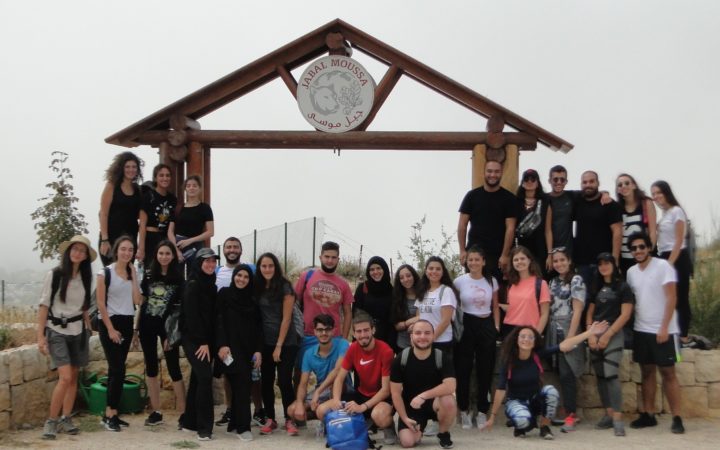
Posted on
(Rome, 11 October 2019) The first student mobility event of the Edu-BioMed project took place last September in the Jabal Moussa UNESCO Biosphere Reserve (BR), in Kesrouan District, Lebanon. On this occasion, students of the American University of Beirut accompanied by architect Mr. Nicolas Fayad of the Department of Architecture and Design, Mr. Moustapha Itani of the Nature Conservation Center and Ms. Takla Khoueiry, field guide and civil engineering student, went to the Jabal Moussa BR as part of a class field visit on the 6th of September 2019.
Twenty eight students of the course “Design IV: Environmentally Responsive Architecture” of this partner University of the Edu-BioMed project, participated in this field visit. Thanks to her background in civil engineering and her involvement in issues pertaining to the needs of the transition and buffer zones of the Biosphere Reserve, the field guide on the trip, Ms. Takla Khoueiry, was a real added-value for the participating students and their class projects to be developed.
In fact, the objective of the course the participating students are following and in which the Edu-BioMed project and objective are particularly useful, is to deliver architecture design projects focused on housing and new ways of living with the environment. This includes sustainable material, passive design strategies and integration with landscape. These projects aim at catering for new user group(s) to relocate to the area for the purpose of living while supporting the biosphere reserve either through research or service.
The projects are expected to be explorative new ideas for future development in the buffer zone, and alternatively, to offer transferable lessons in environmentally sensitive contexts. They aim at proposing viable autonomous communities that can serve as links between BRs and suburban centers. These communities will embody live, eat, work scenarios offering new ways to experience the BRs through novel support programs, such as communal kitchens, research and library space, nurseries.
Design researches and outcomes will be shared with the Association for the Protection of Jabal Moussa and the Edu-BioMed project. Those could afterwards serve as documents for more senior undergraduate or graduate students to pursue their theses and final design projects on the Jabal Moussa BR, as well as for future workshops focusing on the practical implementations of those theoretical possibilities.
This first student mobility event was therefore not only necessary for those students to conceptualize their projects but was also part of the Edu-BioMed’ objective to strengthen, ameliorate and upgrade academic activity at four Moroccan and Lebanese Higher Education Institutions in the context of Mediterranean BRs, in collaboration and through networking inter alia with BR stakeholders, as it has been the case for this field visit of students of American University of Beirut’s students in the Jabal Moussa BR, both partners of the Edu-BioMed project.
The Edu-BioMed provided these students with a unique Biosphere Reserve experience in the lebanese BR of Jabal Moussa, allowing them to develop their projects reflexions while participating to the overall integration of sociocultural practices in conservation management.
_________
To follow the developments and activities of the Edu-BioMed project:



